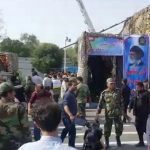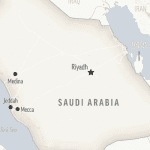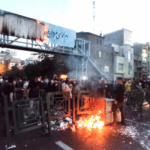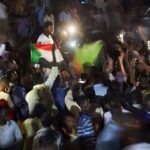Iran on Saturday executed an ethnic Baluch militant convicted of killing Revolutionary Guards members, the judiciary’s official website reported, a day after the United Nations urged Iranian authorities to spare his life.
The Mizan site said Javid Dehghan, who it said was a leader of the Sunni militant group Jaish al-Adl, or the Army of Justice, was hanged for shooting dead two Guards five years ago in the southeastern Sistan-Baluchistan province.
In a tweet on Friday, the United Nations human rights office called for a halt to Dehghan’s imminent execution and condemned “a series of executions – at least 28 – since mid-December, including of people from minority groups.”
World bodies and human rights groups have often criticised Iran for its rights record and large number of executions – the world’s highest after China, according to Amnesty International.
Amnesty said the court that convicted Dehghan relied on “torture-tainted ‘confessions’” and ignored serious abuses of due process by Revolutionary Guards agents and prosecution authorities during the investigation.
The impoverished Sistan-Baluchestan province, which borders Afghanistan and Pakistan, has long been the scene of frequent clashes between security forces and Sunni militants and drug smugglers. The population of the province is predominantly Sunni Muslim, while most Iranians are Shi’ite.
Jaish al-Adl, which says it seeks greater rights and better living conditions for ethnic minority Baluchis, has claimed responsibility for several attacks in recent years on Iranian security forces in the province.
On Thursday, state media said an Iranian member of Islamic State was executed in southwestern Khuzestan province, home to many of Iran’s ethnic Arabs, for taking part in an attack that killed two paramilitary Basij militiamen.
Iran on Saturday executed an ethnic Baluch militant convicted of killing Revolutionary Guards members, the judiciary’s official website reported, a day after the United Nations urged Iranian authorities to spare his life.
The Mizan site said Javid Dehghan, who it said was a leader of the Sunni militant group Jaish al-Adl, or the Army of Justice, was hanged for shooting dead two Guards five years ago in the southeastern Sistan-Baluchistan province.
In a tweet on Friday, the United Nations human rights office called for a halt to Dehghan’s imminent execution and condemned “a series of executions – at least 28 – since mid-December, including of people from minority groups.”
World bodies and human rights groups have often criticised Iran for its rights record and large number of executions – the world’s highest after China, according to Amnesty International.
Amnesty said the court that convicted Dehghan relied on “torture-tainted ‘confessions’” and ignored serious abuses of due process by Revolutionary Guards agents and prosecution authorities during the investigation.
The impoverished Sistan-Baluchestan province, which borders Afghanistan and Pakistan, has long been the scene of frequent clashes between security forces and Sunni militants and drug smugglers. The population of the province is predominantly Sunni Muslim, while most Iranians are Shi’ite.
Jaish al-Adl, which says it seeks greater rights and better living conditions for ethnic minority Baluchis, has claimed responsibility for several attacks in recent years on Iranian security forces in the province.
On Thursday, state media said an Iranian member of Islamic State was executed in southwestern Khuzestan province, home to many of Iran’s ethnic Arabs, for taking part in an attack that killed two paramilitary Basij militiamen.
Iran on Saturday executed an ethnic Baluch militant convicted of killing Revolutionary Guards members, the judiciary’s official website reported, a day after the United Nations urged Iranian authorities to spare his life.
The Mizan site said Javid Dehghan, who it said was a leader of the Sunni militant group Jaish al-Adl, or the Army of Justice, was hanged for shooting dead two Guards five years ago in the southeastern Sistan-Baluchistan province.
In a tweet on Friday, the United Nations human rights office called for a halt to Dehghan’s imminent execution and condemned “a series of executions – at least 28 – since mid-December, including of people from minority groups.”
World bodies and human rights groups have often criticised Iran for its rights record and large number of executions – the world’s highest after China, according to Amnesty International.
Amnesty said the court that convicted Dehghan relied on “torture-tainted ‘confessions’” and ignored serious abuses of due process by Revolutionary Guards agents and prosecution authorities during the investigation.
The impoverished Sistan-Baluchestan province, which borders Afghanistan and Pakistan, has long been the scene of frequent clashes between security forces and Sunni militants and drug smugglers. The population of the province is predominantly Sunni Muslim, while most Iranians are Shi’ite.
Jaish al-Adl, which says it seeks greater rights and better living conditions for ethnic minority Baluchis, has claimed responsibility for several attacks in recent years on Iranian security forces in the province.
On Thursday, state media said an Iranian member of Islamic State was executed in southwestern Khuzestan province, home to many of Iran’s ethnic Arabs, for taking part in an attack that killed two paramilitary Basij militiamen.
Iran on Saturday executed an ethnic Baluch militant convicted of killing Revolutionary Guards members, the judiciary’s official website reported, a day after the United Nations urged Iranian authorities to spare his life.
The Mizan site said Javid Dehghan, who it said was a leader of the Sunni militant group Jaish al-Adl, or the Army of Justice, was hanged for shooting dead two Guards five years ago in the southeastern Sistan-Baluchistan province.
In a tweet on Friday, the United Nations human rights office called for a halt to Dehghan’s imminent execution and condemned “a series of executions – at least 28 – since mid-December, including of people from minority groups.”
World bodies and human rights groups have often criticised Iran for its rights record and large number of executions – the world’s highest after China, according to Amnesty International.
Amnesty said the court that convicted Dehghan relied on “torture-tainted ‘confessions’” and ignored serious abuses of due process by Revolutionary Guards agents and prosecution authorities during the investigation.
The impoverished Sistan-Baluchestan province, which borders Afghanistan and Pakistan, has long been the scene of frequent clashes between security forces and Sunni militants and drug smugglers. The population of the province is predominantly Sunni Muslim, while most Iranians are Shi’ite.
Jaish al-Adl, which says it seeks greater rights and better living conditions for ethnic minority Baluchis, has claimed responsibility for several attacks in recent years on Iranian security forces in the province.
On Thursday, state media said an Iranian member of Islamic State was executed in southwestern Khuzestan province, home to many of Iran’s ethnic Arabs, for taking part in an attack that killed two paramilitary Basij militiamen.
Iran on Saturday executed an ethnic Baluch militant convicted of killing Revolutionary Guards members, the judiciary’s official website reported, a day after the United Nations urged Iranian authorities to spare his life.
The Mizan site said Javid Dehghan, who it said was a leader of the Sunni militant group Jaish al-Adl, or the Army of Justice, was hanged for shooting dead two Guards five years ago in the southeastern Sistan-Baluchistan province.
In a tweet on Friday, the United Nations human rights office called for a halt to Dehghan’s imminent execution and condemned “a series of executions – at least 28 – since mid-December, including of people from minority groups.”
World bodies and human rights groups have often criticised Iran for its rights record and large number of executions – the world’s highest after China, according to Amnesty International.
Amnesty said the court that convicted Dehghan relied on “torture-tainted ‘confessions’” and ignored serious abuses of due process by Revolutionary Guards agents and prosecution authorities during the investigation.
The impoverished Sistan-Baluchestan province, which borders Afghanistan and Pakistan, has long been the scene of frequent clashes between security forces and Sunni militants and drug smugglers. The population of the province is predominantly Sunni Muslim, while most Iranians are Shi’ite.
Jaish al-Adl, which says it seeks greater rights and better living conditions for ethnic minority Baluchis, has claimed responsibility for several attacks in recent years on Iranian security forces in the province.
On Thursday, state media said an Iranian member of Islamic State was executed in southwestern Khuzestan province, home to many of Iran’s ethnic Arabs, for taking part in an attack that killed two paramilitary Basij militiamen.
Iran on Saturday executed an ethnic Baluch militant convicted of killing Revolutionary Guards members, the judiciary’s official website reported, a day after the United Nations urged Iranian authorities to spare his life.
The Mizan site said Javid Dehghan, who it said was a leader of the Sunni militant group Jaish al-Adl, or the Army of Justice, was hanged for shooting dead two Guards five years ago in the southeastern Sistan-Baluchistan province.
In a tweet on Friday, the United Nations human rights office called for a halt to Dehghan’s imminent execution and condemned “a series of executions – at least 28 – since mid-December, including of people from minority groups.”
World bodies and human rights groups have often criticised Iran for its rights record and large number of executions – the world’s highest after China, according to Amnesty International.
Amnesty said the court that convicted Dehghan relied on “torture-tainted ‘confessions’” and ignored serious abuses of due process by Revolutionary Guards agents and prosecution authorities during the investigation.
The impoverished Sistan-Baluchestan province, which borders Afghanistan and Pakistan, has long been the scene of frequent clashes between security forces and Sunni militants and drug smugglers. The population of the province is predominantly Sunni Muslim, while most Iranians are Shi’ite.
Jaish al-Adl, which says it seeks greater rights and better living conditions for ethnic minority Baluchis, has claimed responsibility for several attacks in recent years on Iranian security forces in the province.
On Thursday, state media said an Iranian member of Islamic State was executed in southwestern Khuzestan province, home to many of Iran’s ethnic Arabs, for taking part in an attack that killed two paramilitary Basij militiamen.
Iran on Saturday executed an ethnic Baluch militant convicted of killing Revolutionary Guards members, the judiciary’s official website reported, a day after the United Nations urged Iranian authorities to spare his life.
The Mizan site said Javid Dehghan, who it said was a leader of the Sunni militant group Jaish al-Adl, or the Army of Justice, was hanged for shooting dead two Guards five years ago in the southeastern Sistan-Baluchistan province.
In a tweet on Friday, the United Nations human rights office called for a halt to Dehghan’s imminent execution and condemned “a series of executions – at least 28 – since mid-December, including of people from minority groups.”
World bodies and human rights groups have often criticised Iran for its rights record and large number of executions – the world’s highest after China, according to Amnesty International.
Amnesty said the court that convicted Dehghan relied on “torture-tainted ‘confessions’” and ignored serious abuses of due process by Revolutionary Guards agents and prosecution authorities during the investigation.
The impoverished Sistan-Baluchestan province, which borders Afghanistan and Pakistan, has long been the scene of frequent clashes between security forces and Sunni militants and drug smugglers. The population of the province is predominantly Sunni Muslim, while most Iranians are Shi’ite.
Jaish al-Adl, which says it seeks greater rights and better living conditions for ethnic minority Baluchis, has claimed responsibility for several attacks in recent years on Iranian security forces in the province.
On Thursday, state media said an Iranian member of Islamic State was executed in southwestern Khuzestan province, home to many of Iran’s ethnic Arabs, for taking part in an attack that killed two paramilitary Basij militiamen.
Iran on Saturday executed an ethnic Baluch militant convicted of killing Revolutionary Guards members, the judiciary’s official website reported, a day after the United Nations urged Iranian authorities to spare his life.
The Mizan site said Javid Dehghan, who it said was a leader of the Sunni militant group Jaish al-Adl, or the Army of Justice, was hanged for shooting dead two Guards five years ago in the southeastern Sistan-Baluchistan province.
In a tweet on Friday, the United Nations human rights office called for a halt to Dehghan’s imminent execution and condemned “a series of executions – at least 28 – since mid-December, including of people from minority groups.”
World bodies and human rights groups have often criticised Iran for its rights record and large number of executions – the world’s highest after China, according to Amnesty International.
Amnesty said the court that convicted Dehghan relied on “torture-tainted ‘confessions’” and ignored serious abuses of due process by Revolutionary Guards agents and prosecution authorities during the investigation.
The impoverished Sistan-Baluchestan province, which borders Afghanistan and Pakistan, has long been the scene of frequent clashes between security forces and Sunni militants and drug smugglers. The population of the province is predominantly Sunni Muslim, while most Iranians are Shi’ite.
Jaish al-Adl, which says it seeks greater rights and better living conditions for ethnic minority Baluchis, has claimed responsibility for several attacks in recent years on Iranian security forces in the province.
On Thursday, state media said an Iranian member of Islamic State was executed in southwestern Khuzestan province, home to many of Iran’s ethnic Arabs, for taking part in an attack that killed two paramilitary Basij militiamen.














